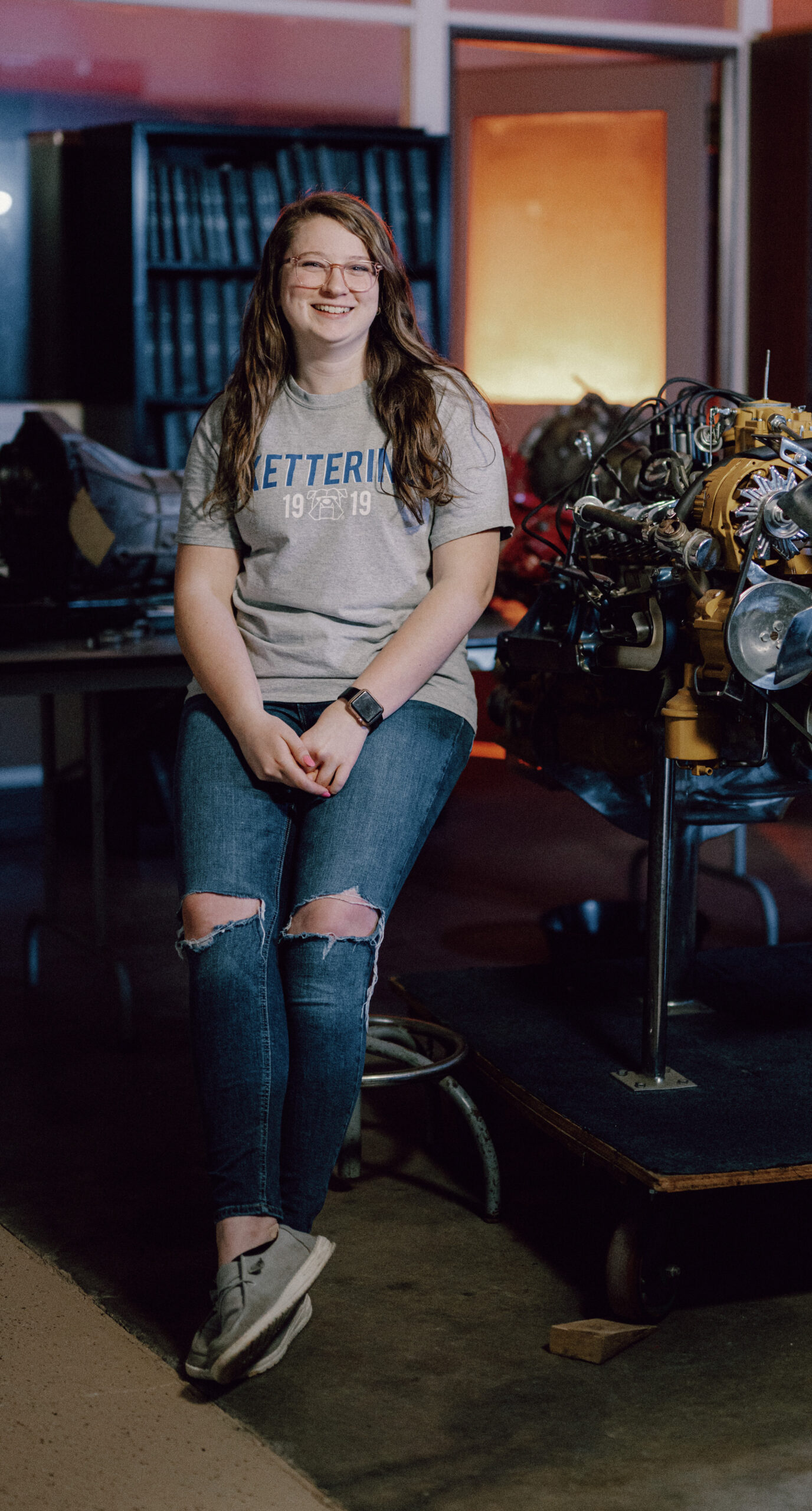Mechanical Engineering, B.S.
Mechanical engineers build and test systems ranging from microscale sensors to spacecraft. Master machine design and the principles of motion to analyze, innovate and optimize mechanical systems that impact our world.
Why Study Mechanical Engineering at Kettering University
Develop market-ready solutions in fields like automotive, aerospace, robotics, renewable energy and more with Kettering University’s Bachelor of Science (B.S.) in Mechanical Engineering degree program. Ranked #12 for Best Undergraduate Mechanical Engineering Programs by U.S. News & World Report, it combines hands-on classroom and lab learning with paid Co-op experiences with industry partners to help you start ahead of the curve — and stay there.
From day one, you’ll be immersed in cutting-edge facilities like our Crash Safety Center, e-Design and e-Manufacturing Studio, Fuel Cells Lab, SEO Design Studio and Advanced Engine Research Lab. Participate in competitive teams in robotics or automotive design to hone your skills in mechanical system design, optimization, prototyping and testing. We even offer concentrations so you can customize your degree.
Take a tour of Kettering’s GM Mobility Research Center, where you can help build the future of autonomous vehicles. View the vehicles, test pad and test track that students use every day.
College of Engineering
Department of Mechanical Engineering
Email: me@kettering.edu
Phone: (810) 762-7992
What You’ll Learn as a Mechanical Engineering Major
Mechanical engineering at Kettering teaches you to design and analyze mechanical systems — especially those that move. Understand the scientific principles behind autonomous vehicles, drones, robots, mechatronics and the components that power them.
Our curriculum covers foundational topics like advanced math and physics and delves into core engineering topics such as thermodynamics and fluid mechanics. You may even choose a concentration to focus your studies:
Co-op Experience + Career Opportunities
Gain real-world experience with companies tackling the mechanical engineering problems of today — and help solve them.
Mechanical Engineering Career Paths:
- Aerospace Engineer
- Automotive Engineer
- Biomedical Engineer
- Manufacturing Engineer
- Materials Engineer
- Robotics Engineer
Companies You Can Work With:
- ABB Robotics
- Bosch
- Eaton Corporation
- Ford Motor Company
- General Motors
- Magna
- Mettle Ops ZF
- Raytheon Technologies
- Stellantis

Build the Vehicles of Tomorrow
Build, test, experiment with and troubleshoot driverless cars and other vehicles at Kettering’s GM Mobility Research Center. This research facility boasts an autonomous vehicle testing track that’s the only one of its kind on a college campus.
Learn More About the B.S. in Mechanical Engineering
Concentrations for the Bachelor’s in Mechanical Engineering
Select one of four concentration areas during your final year at Kettering for additional expertise. These specialized tracks prepare you for industry roles or graduate study while giving you a competitive edge.
Work in the growing field of sustainability and renewable energy. Gain expertise in technologies like solar, fuel cells, and hybrid and electric vehicles.
Benefit from Kettering’s historical connection to the automotive industry. Immerse yourself in courses that cover engine design to vehicle performance. You can also spend valuable time in our research facilities, such as Kettering’s Crash Safety Center.
Combine engineering with healthcare in this important field. Learn to create medical devices that can improve patient outcomes and care.
Machine Design & Advanced Materials
Make any product — the landing gear on an airplane to an autonomous drone — better. Master product design, from analyzing new materials to modifying existing goods for better performance and efficiency.
Senior Thesis
Showcase your abilities as a mechanical engineer with the senior thesis. Work with your Co-op employer in this project, which serves as your capstone and culminating academic experience. This open-ended design challenge gives you the opportunity to:
- Identify and define a complex engineering problem
- Assemble a project team and develop a solution strategy
- Apply knowledge and technical skills gained throughout your studies
- Design, prototype and test an innovative product or process
Your project may involve creating a new product design, optimizing manufacturing processes or developing a new test method. You may even identify a real-world challenge you’ve seen in your Co-op and develop an original solution!
Career Outcomes for Mechanical Engineering Majors
Mechanical engineers build machines to solve problems or create useful products, from engines and elevators to medical devices and robotic systems. The U.S. Bureau of Labor Statistics (BLS) forecasts employment for mechanical engineers will grow 10 percent through 2032. The BLS also reports that in 2023, the median pay for mechanical engineers was $99,510.
Accreditation
Kettering’s Bachelor of Science in Mechanical Engineering program is accredited by the Engineering Accreditation Commission (EAC) of ABET, http://www.abet.org.
The Student Perspective
“Kettering pushes you to pursue your own path. To see it through to the end, put in the work, and feel like you’ve truly achieved something.”
Katee Callicutt
Mechanical Engineering ‘27

Explore Related Programs
Gain a broad foundation in engineering and select a concentration in manufacturing, mechatronics, robotics systems or engineering management to refine your skills.
Create innovative solutions to optimize complex systems for maximum efficiency. Learn to design assembly lines, use machinery and enhance workplace safety.
Discover new ways to generate power, improve robot control and revolutionize electric vehicle systems. Get hands-on experience with circuits, virtual reality and more.
Next Steps
Don’t wait for the future. Build the machines of tomorrow and emerge as a leader in this fast-evolving field with Kettering University’s Bachelor of Science in Mechanical Engineering program.
